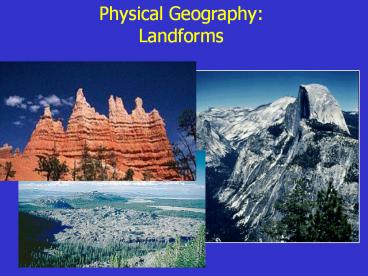Physical Geography: Landforms - PowerPoint PPT Presentation
1 / 42
Title:
Physical Geography: Landforms
Description:
subduction; shallow to deep earthquakes; volcanism (continental) Features: ... intrusive: formed inside the Earth. extrusive: formed at Earth's surface ... – PowerPoint PPT presentation
Number of Views:1982
Avg rating:3.0/5.0
Title: Physical Geography: Landforms
1
- Physical Geography Landforms
2
Relief on Land Topography
3
- 7 major plates several minor plates
- Small plates / boundaries still unknown
4
- Divergence, convergence, and shearing along these
plate boundaries leads to orogenesis
(mountain-building) and relief.
5
Plate Tectonics Theory
- Plate boundaries main location for
Earths volcanic and earthquake activity. This is
main place where mountains are created. - Type of plate boundary determines activity.
- 3 types
- divergent (spreading) compression force
- convergent (colliding) tension force
- transform (sliding past each other) shear force
6
Plate Margins how do we know?
- Marked by volcanic and tectonic activity
7
Sea Floor Spreading
8
Divergent Plate Boundaries
- Landscape features
- land rift valleys, volcanic mountains, thinning
crust - ocean/sea rift valleys, undersea mountain ranges
9
Convergent Plate Boundaries
- Activity
- subduction shallow to deep earthquakes
volcanism (continental) - Features
- ocean trench explosive volcanic mountains on
continental margin
10
Subduction Denser crust sinks beneath nearby
plate and is destroyed.
Explosive Volcano
11
The Rock Cycle
12
Earth Materials
- Formation of Earth
- Three major rock types
- Igneous
- Sedimentary
- Metamorphic
13
Igneous Rocks
- Igneous (ignus fire)
- Formed from the cooling of molten rock
(magma/lava), a process called crystallization. - Slow cooling ? larger crystals gt dense rock
- Rapid cooling ? small crystals gt lighter rock
14
- Two classes of igneous rocks
- intrusive formed inside the Earth
- extrusive formed at Earths surface
15
Igneous Extrusive Rocks
- Cools rapidly - exposed to surface
- No visible crystals
- Examples
- - rhyolite - andesite -basalt
16
Igneous Extrusive Landscapes
Flood Basalt, Northern California
Volcan Arenal, Costa Rica
- Volcanic dike and neck Shiprock, NM
17
Some unique volcanic rock types
- ? Pumice (vesicular)
- - sometimes so light it floats!
- Obsidian ?
- glassy, curved fracturing
- used for arrowheads by Native Americans
18
Typical Igneous Intrusions
19
Igneous Intrusive Rocks
- Cools slowly (thousands of years)
- Visible crystals
- Examples
- - granite, andesite
20
Exposed Batholiths
Sierra Nevada, CA
21
Sedimentary Rocks
22
Where do Sedimentary Rocks Form?
- Marine environments
- Continental shelf
- Continental slope and rise (deep sea fans)
- Abyssal plain
- Beach and barrier islands
- Terrestrial environments (non-marine)
- Rivers and floodplains (fluvial environment)
- Lakes
- Deserts (aeolian environment)
23
Sedimentary Rocks
Relative Abundance by Type
Cementing
Compaction
Formation
24
Limestone (CaCO3)
Shale (fine grains)
Sandstone (larger grains)
25
(No Transcript)
26
Metamorphic Rocks or Thats very Gneiss, but I
dont give a Schist!
Schist (narrow foliation)
Gneiss (broad foliation)
27
Metamorphic Rocks
Pemaquid Point, Maine
28
Distribution of Rock Types
29
What type?
30
Metamorphic Banded Gneiss, Greenland, 3-3.8
billion years old
What type?
31
What type?
32
Sedimentary Sandstone in Bryce Canyon N.P.,
Utah
What type?
33
Which type?
34
Which type?
Extrusive Igneous Sunset Crater N.M., Arizona
35
What type?
36
Which type?
Folded Sedimentary - Sheep Fold, Wyoming
37
Which type?
38
Which type? Granite Joshua Tree N.P.,
California
39
What type?
40
What type?
Sedimentary - Vasquez Rocks, Southern California
41
Distribution of Rock Types
42
The Rock Cycle































